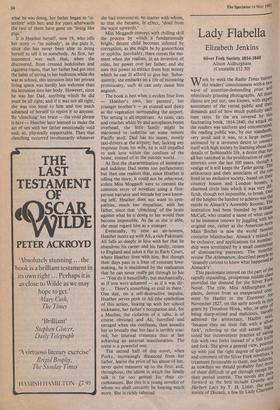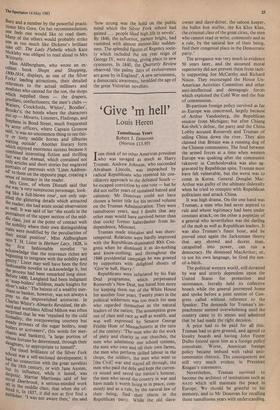Lady Flabella
Elizabeth Jenkins
Silver Fork Society 1814-1840 Alison Aldburgham (Constable £12.50)
week by week the Radio Times batters the readers' consciousness with a new wave of attention-demanding print and relentlessly grinning photographs. All these_, claims are put out, one knows, with expai. assessment of the varied public and the demands and of how much publicity eac.11 item rates. In the era covered by this fascinating book, 1814-1840, the attack on the readers was uniform and concentrated; the reading public was, by our standards, very small and it was, to a large extent, animated by a ravenous desire to connect itself with high society by learning about the details of fashionable life, a desire that has all but vanished in the proliferation of other interests over the last 100 years, though a vestige of it still keeps the Tatler going. The aristocracy and their associates of the ro.r1 lived in an exclusive society, based on their country houses and London houses, . a charmed circle into which it was very clif" ficult, though not impossible, to break. One of the heights the hardest to achieve was the entrée to Almack's Assembly Rooms. The institution had been founded by Willi° McCall, who created a name of what carae to be immense renown by juggling with his original one, rather as the American-h°111 Main Bocher is now the world fartwus couturier Mainbocher. Almack's existed t° be exclusive, and applications for member- ship were scrutinised by a small committee of domineering peeresses. The monthlY review The Athenaeum, described people as 'insanely curious to know what happen
Almack's'. he ed at
This passionate interest on the part oft rapidly expanding, prosperous middle class provided the demand for the Silver Fork Novel. The title, Miss Aldburgham ex- plains, derives from an exasperated coat' ment by Hazlitt in the Examiner Rif November 1827, on the early novels in this, genre by Theodore Hook, who, in spite being sharp-witted and malicious, on/CI?' admired the aristocracy, Hazlitt S. 'because they eat their fish with a si!ve fork', referring to the still extant, high- toned but inconvenient practice of eau!!! fish with two forks instead of a fish kni'd'" and fork. She gives a general view, 90 up with just the right degree of quotatiol; and comment of the Silver Fork novelists, treatment favourable to them, one believes: as nowdays we should probably find Ws; of them difficult to get through except
for
their period interest. The novels she P11`, forward as the best include Granby an," Herbert Lacy by T. H. Lister, the earleY novels of Disraeli, a few by Lady Charlott
Bury and a number by the powerful practi- tioner Mrs Gore. On her recommendation, one feels one would like to read them.
Many of the others would probably strike one as too much like Dickens's brilliant take off: The Lady Flabella which Kate
Nickleby was obliged to read aloud to Mrs Wititterly.
Miss Aldburgham, who wrote an ex- cellent book Shops and Shopping, 1800-1914, displays, as one of the Silver Forks' leading attractions, their detailed references to the actual milliners and modistes who catered for the ton, the shops Which supplied them — the drapers, Jewellers, confectioners; the men's clubs — Waders, Crockfords, Whites', Boodles', Brooks's; the hotels where the characters Put up — Mivarts, Limmers, Fladongs, and Stephens in Bond Street, much frequented by army officers, where Captain Gronow said, 'it was no uncommon thing to see thir- ty or forty saddle horses and tilbunes waiting outside'. Another literary form Which enjoyed enormous success because it combined interesting fiction and thrilling fact was the Annual, which contained not Only articles and short stories but engraved Portraits of peeresses with 'Lines Address- ed to them on the opposite page, creating a sense of intimacy in the reader.
Mrs Gore, of whom Disraeli said that She was 'a very sumptuous personage, look- ing like a full-blown rose', not only sup- Phed the glittering details which attracted the reader; she had acute social observation as well. It was said of her 'she excels in the Portraiture of the upper section of the mid- dle just at the point of contact with
the nobility where their own distinguishing traits were modified by the peculiarities of their social position'. Miss Aldburgham says T. H. Lister in Herbert Lacy, 1828, is the first fashionable novelist 'to acknowledge that the nouveaux riches are beginning to integrate with the nobility and gentry.' Lister may well have been the first fashionable novelist to acknowledge it, but the process had been remarked long since. Before 1400, Langland had been indignant at soap-boilers children, made knights for Silver's sake.' The heiress of a wealthy mer-
chant or banker, however, was not always a
Prey to the impoverished aristocrat. In Charles White's Almacks Revisited, the ab-
surd and worthless Alfred Milton was often
surprised that he was 'repulsed by the cold lortnality, the overpowering courtesy but boilers protests of the sugar boilers, soap oilers or scriveners', (his words for mer-
chants and bankers), 'a large portion of
Whose fortune he determined, through their daughters, to appropriate to himself'.
The tinsel brilliance of the Silver Fork had was a self-enclosed development; it bad no connection with the great novelists
but the 18th century, or with Jane Austen, b.ut its influence, while it lasted, was
clesPotic. Harriet Martineau said of her
aPve1 Deerbrook, a serious-minded work set in the middle class, that when she of- fered it, in 1837, it did not at first find a Publisher. 'I was not aware then,' she said 'how strong was the hold on the public mind which the Silver Fork school had gained ... people liked high life in novels'. By 1840, the influence, meteor bright, had vanished with almost meteor-like sudden- ness. The splendid figures of Regency socie- ty which included the ten year reign of George IV, were dying, giving place to new cynosures. In 1840, the Quarterly Review observed 'the Palmy days of exclusiveness are gone by in England'. A new seriousness, a democratic awareness, heralded the age of the great Victorian novelists.











































 Previous page
Previous page